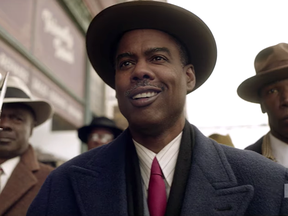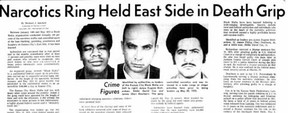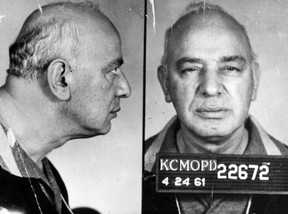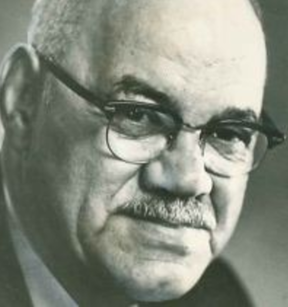Where Did the Civella Family Live in Kansas City?
CRIME HUNTER: Fargo takes shot at notorious Kansas City Black Mafia

James (Doc) Dearborn hitting the pavement with a thud outside a liquor store almost the Kansas Metropolis Airport on Jan. fourteen, 1985.
The 1-time pooh-bah of Kansas City's and then-called Blackness Mafia was 53 years one-time. And quite dead.
Thirty-five years after hitters punched him a one-manner ticket to the morgue, Dearborn remains an enigmatic figure. Equally recently every bit 2011, detectives were all the same linking him to long-ago gangland murders.
Law-breaking has been the ladder to the mainstream for generations of immigrants — and chronic outsiders.
Irish, Jews, Italians and endless others who found doors closed in their faces when it came to jobs, housing and opportunities, did what they had to exercise to survive. Cut corners was a way to get on the ladder.
Far worse off than any indigenous grouping were African-Americans. For many, slavery wasn't just a retentivity — they had lived it, kept on living information technology and go along on living information technology.
And they too turned to racketeering, vice and a myriad of other crimes to make ends meet and provide a better life for their families

The new flavour of Fargo, starring Chris Rock, takes aim at the history of racism and discrimination that collection men such as Dearborn, Bumpy Johnson and Leroy Barnes into the underworld. Rock plays Loy Cannon, a fictional grapheme who is believed to be based on Dearborn.
The action takes place in Kansas City in the 1950s when an uneasy peace existed between men such as Dearborn and the long-established Italian mob family run for decades by Nick Civella.
It was the Kansas Urban center mob that oversaw the pillaging of the Teamsters Midwest Pension Fund, using the cash of difficult-working truckers for schemes in the desert gambling mecca of Las Vegas.

In many ways, the underworld was multicultural before the rest of society caught up. It was business. Crime has simply i color — and information technology's green. The Chicago outfit remains a testament to prematurely awoken gangsters.
While the fourth flavor of Fargo shows the 2 underworld entities at war, in reality they worked closely together.
Dearborn's crew was called the Purple Sheathing Gang — or PCG — considering that was the colour their capsules of heroin came in. The become-between was gangster Joseph (Shotgun Joe) Centimano.
The rotund mobster operated out of Joe's Liquors, which was in one of Thousand.C.'s Black neighbourhoods near the famed Vine Jazz Commune. Many of its residents had moved from the s looking for opportunities and a better life in the city's stockyards and factories.
Shotgun Joe was Dearborn's conduit to the Mafia.
Between them, the two mobs joined forces to rake in boffo bucks from prostitution, drugs, gambling and extortion. And they didn't like it when people got in their way.
In the past decade, common cold example detectives take cleared several unsolved homicides dating to the late 1960s and early 1970s.
The murders were pinned on Dearborn and his gangland benefactor, Shotgun Joe.
Nigh prominent among the slayings was the 1970 murder of ceremonious rights activist and Missouri politician Leon Hashemite kingdom of jordan, who had a storied career every bit ane of the starting time Blackness detectives on the Kansas City PD.

Mob dominate Civella ordered Jordan taken off the board, the Kansas Urban center Star reported, and assigned Dearborn and Shotgun Joe to do the job.
Jordan was shot to expiry on July 15, 1970, exterior his pop Green Duck Tavern. He reportedly had a run-in with mob-continued state legislator Frank Mazzuca and was engulfed in a love triangle with a woman that Dearborn had his sights set on.
Dearborn was charged with the slaying in 1971, but the case was dropped before it went to trial.
In 2011, detectives also closed the 1968 slaying of K.C. criminal Ricky Colina over an alleged dope theft. He was found with a single bullet to the head underneath a local bridge.
Again, Dearborn and Shotgun Joe did the deed.
"I was shocked that they finally found somebody after all these years," Loma's widow, Lena Bruster told the Kansas Urban center Star. "He was a prissy father and loved his children. Thank God nosotros were able to get real closure."
It was Shotgun Joe's son who concluded decades of silence and told detectives everything he knew.
Loma'south widow said that after Ricky was murdered, Dearborn would come into the diner where she worked as a waitress and leave her $100 tips.
gonzalezableatifes.blogspot.com
Source: https://torontosun.com/news/world/crime-hunter-fargo-takes-shot-at-notorious-kansas-city-black-mafia

0 Response to "Where Did the Civella Family Live in Kansas City?"
Post a Comment